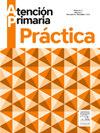Calidad de la información en las historias clínicas de personas con diabetes mellitus tipo 2 sobre el cuidado de los pies en centros de atención primaria de salud de Ecuador
Q4 Medicine
引用次数: 0
Abstract
Objective
To analyze the quality of information recorded in medical records, with an emphasis on foot care guidance for people with type 2 diabetes mellitus.
Design
Cross-sectional multicenter study.
Setting
Four primary care centers in Ecuador.
Participants
Medical records of 489 randomly selected individuals with type 2 diabetes mellitus.
Main measurements
Outcome variable: recording of care in four sections of the medical record: anamnesis, physical examination, complementary tests, and comprehensive evaluation. Explanatory variables: health center, age, and sex. Proportions and adjusted odds ratios (OR) were calculated using logistic regression with their confidence intervals.
Results
Of the 489 medical records, 57.9% were women. Twenty-three percent had no record of medical control, 98.2% lacked a podiatric assessment, 3.1% included an eye fundus exam, 4.3% had an electrocardiogram, and 7.6% had a psychosocial interconsultation. Being an older adult was associated with a higher likelihood of recording comorbidities (OR = 1.9), foot physical examination (OR = 1.7), neurological evaluation (OR = 2.9), and complementary tests (creatinine OR = 1.5, cholesterol OR = 1.8).
Conclusion
The study reveals poor quality in the clinical information recorded for individuals with diabetes, especially in podiatric assessments and the ordering of complementary tests. Older adults showed more complete records, highlighting the need to improve the consistency of care and recording for all patients. It is crucial to implement strategies that strengthen foot care guidance and the integrity of clinical records in the management of diabetes.
厄瓜多尔初级保健中心 2 型糖尿病患者足部护理病历信息的质量。
目的分析医疗记录中记录的信息质量,重点是为 2 型糖尿病患者提供足部护理指导。设计横断面多中心研究。解释变量:医疗中心、年龄和性别。结果 在 489 份病历中,57.9% 为女性。23%的人没有医疗控制记录,98.2%的人缺乏足科评估,3.1%的人进行了眼底检查,4.3%的人进行了心电图检查,7.6%的人进行了社会心理会诊。老年人记录合并症(OR = 1.9)、足部体格检查(OR = 1.7)、神经评估(OR = 2.9)和辅助检查(肌酐 OR = 1.5,胆固醇 OR = 1.8)的可能性较高。老年人的记录更为完整,这说明有必要提高所有患者的护理和记录的一致性。在糖尿病管理中,实施加强足部护理指导和临床记录完整性的策略至关重要。
本文章由计算机程序翻译,如有差异,请以英文原文为准。
求助全文
约1分钟内获得全文
求助全文
来源期刊

Atencion Primaria Practica
Medicine-Family Practice
CiteScore
0.30
自引率
0.00%
发文量
40
审稿时长
24 days
 求助内容:
求助内容: 应助结果提醒方式:
应助结果提醒方式:


